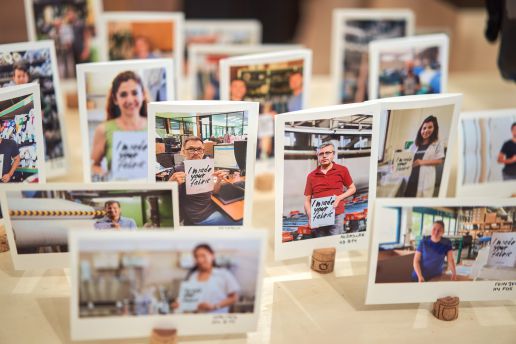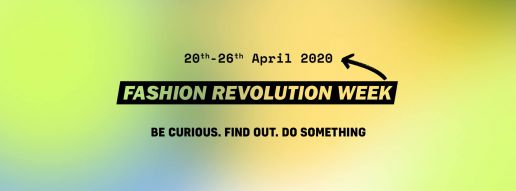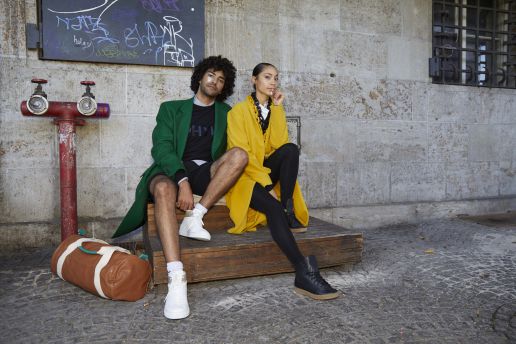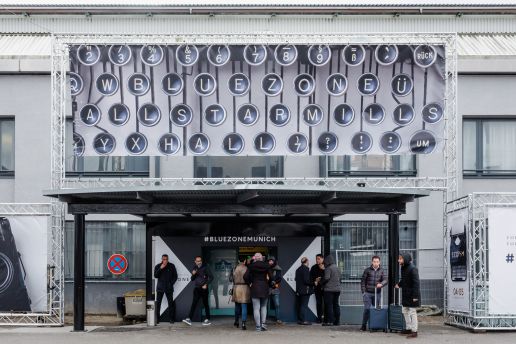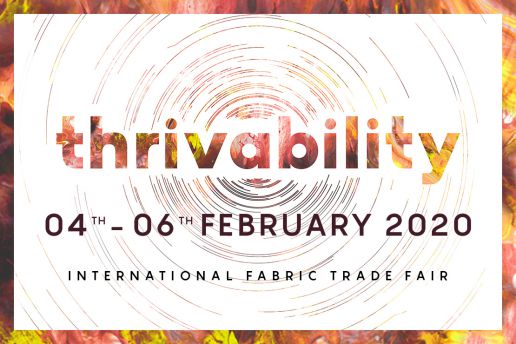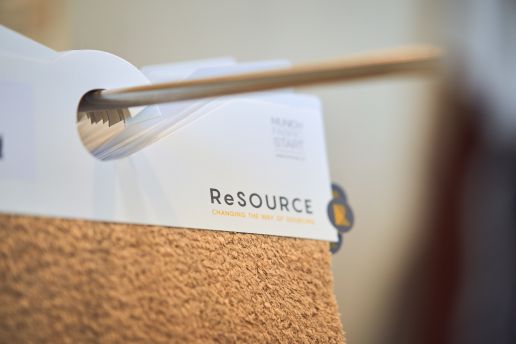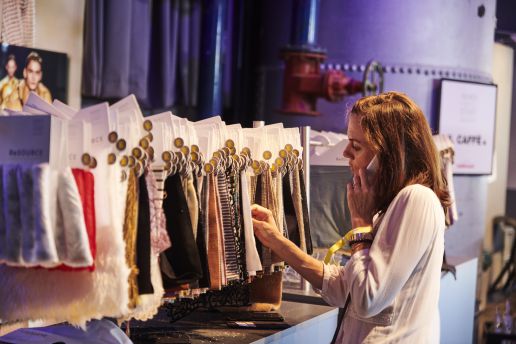Sustainable Fashion
Fashion Revolution at Munich Fabric Start
Since Fashion Revolution started, consumers, activists, brands and businesses have used their voices to demand change from the fashion industry to ensure fashion is made in a safe, clean and fair way. In our position as an industry platform we are able to convey the significance of this movement to our community of fashion professionals but also to our global network of manufacturers and suppliers operating in the textile and fashion industry.
At previous editions of our shows we reached out to our exhibitors to get involved in the viral movement #WHOMADEMYCLOTHES and send us photographs of their team responding to the question ‘Who Made My Fabrics, Trims, Prints and Denim?’. Displaying these in our busy trend and entrance areas helps send a powerful message to our audience and communities that these businesses are prepared and willing to support this Fashion Revolution movement leading to greater transparency and traceability throughout the supply chain, from fiber all the way to the end consumer.
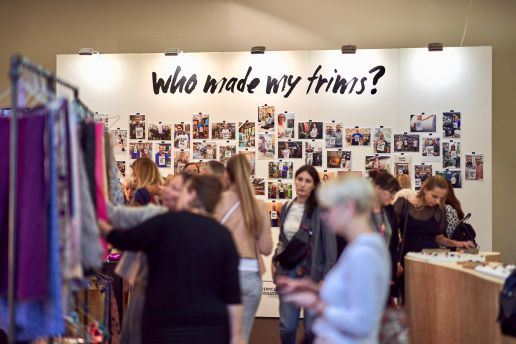
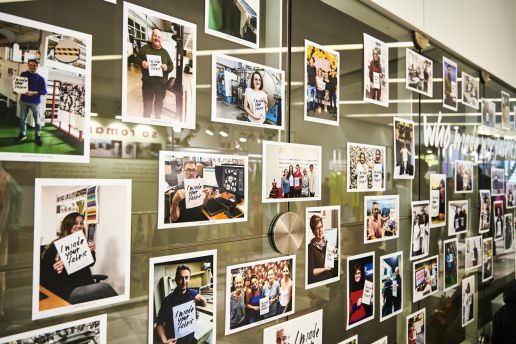
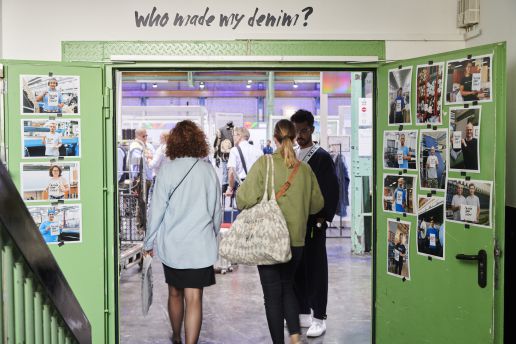
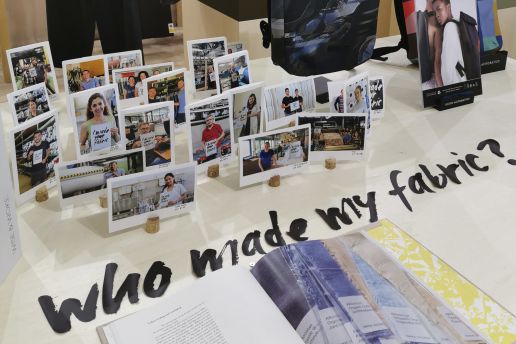
Sustainability in the textile and fashion industry is hugely multifaceted therefore the aim at our events is not only to provide a platform to promote new sustainable technology, material and fibre innovation but also to provide the necessary resources and educational tools to encourage and support the growth of sustainable processes and practices. Find out how we are creating future with KEYHOUSE, our hub for innovation at Munich Fabric Start.
The response at our shows has been overwhelmingly positive and exhibitor involvement has been a great success which we hope will continue to grow season after season. Once again, #WHOMADEMYCLOTHES will be featured in the trend areas and entrance ways at the upcoming MUNICH FABRIC START and BLUEZONE shows in September 2020. Read the latest news on our event planning during these times of Covid-19, here.
FASHION REVOLUTION WEEK
Fashion Revolution Week 2020 will shine a light on the steps needed to bring about revolutionary change at this pivotal point in the history of the fashion industry. Now, more than ever before, the industry is coming under increasing scrutiny and millions of people around the world are expected to participate in Fashion Revolution Week as it moves online. Find out how you can get involved now.
Growing Fair Fashion in Munich with GREENSTYLE
Due to the current Covid-19 situation and the accompanying event guidelines, this event has been cancelled or will be postponed to a later date. For more information, please visit the Greenstyle Hompeage.
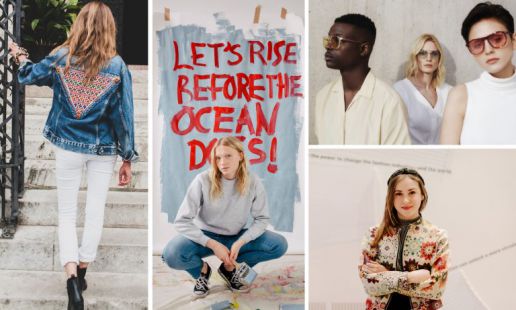
IT’S ON YOU TO BE THE CHANGE
Sustainability is in. But sustainability is more than a trend. Sustainability is THE defining topic of the fashion industry – now and in the future. With 50 brands and exciting approaches from recycling to upcycling to zero waste, circular fashion and innovative consumer models, the consumer format GREENSTYLE Munich brings various facets of sustainable fashion to the Isarforum in the Deutsches Museum in Munich from March 13th to 15th. The format creates lasting impact with exciting speakers from science, industry, trade and NGOs during the two day conference program.
We spoke with Mirjam Smend, greenfluencer, journalist, Fashion Revolution ambassador and the founder of GREENSTYLE, Mirjam Smend.
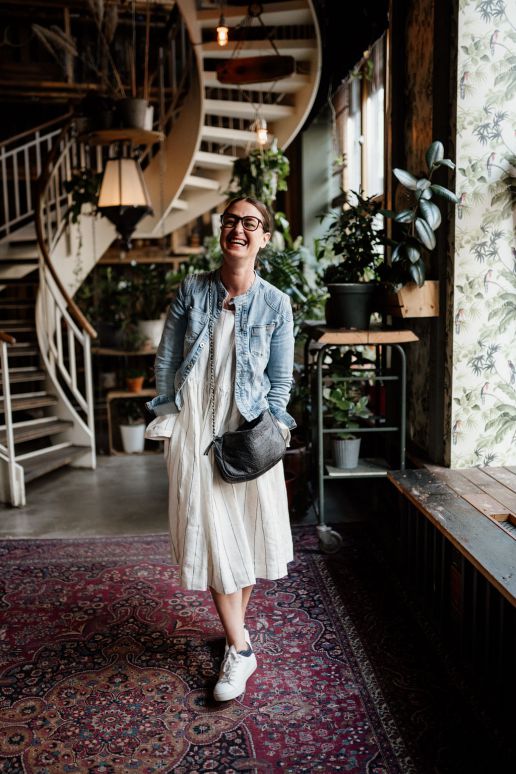
What can you tell us about the growing interest in sustainable fashion?
Interest has grown significantly over the past year. We can see that in the number of visitors and by the growing inquiries from exhibitors and the press.
Do you have any top tips for visitors who may be attending for the first time?
Be sure to bring time, because there are 50 great brands with exciting stories in stock. Also, our two day conference program with inspiring topics. There is (free!) fairtrade coffee, delicious vegan catering and of course the iconic GREENSTYLE vibes.
#letschangethatfashiongame
In what way is GREENSTYLE helping to spread sustainable fashion, especially among those who are unaware of the harmful effects of conventional fashion consumption?
With our brands, we are targeting people with an interest in fashion to show them sustainable alternatives. Contemporary fashion that was made with as little impact as possible for people, animals and nature. We have representatives on site who are showcasing alternative consumption models, for example, borrowing clothes reduces the ecological footprint by 70 percent and also allows for greater variety in the wardrobe. With the conference we want to enlighten, but also inspire. There are topics from the status quo of sustainable fashion to finding one’s own style, capsule wardrobes, and innovative shopping models as well we are especially excited to host a discussion on the impact of fashion on the climate with one of the world’s most renowned climate researchers.
GREENSTYLE makes Munich a sustainable hotspot again – this time as a partner of Munich Creative Business Week (MCBW), taking place March 7th – 15th in Munich.
GREENSTYLE FAIR
Bomber jackets made from post-consumer waste, product codes on textiles, alternative consumption models and rediscovered natural (hemp) and maximum innovative materials such as apple skin – with 50 brands , GREENSTYLE Munich shows different facets of sustainable fashion and at the same time remains the largest event of its kind since its foundation in October 2018. The successful “Meet the Maker” concept will also be continued at the 4th edition, because the direct contact between the brand and the consumer ensures the necessary transparency, which is one of the most important elements of sustainable fashion.
“Consumption is no longer a self-expression. Consumption is a responsibility. ”- Claudia Hofmann, Fashion Council Germany
GREENSTYLE CONFERENCE
The conference program for the 4th edition has once again been expanded. With over 30 speakers, solutions for a more sustainable fashion industry are discussed from different perspectives. Panel guests include Folkdays founder Lisa Jaspers, who calls for a supply chain law with #fairbylaw. Climate researcher Prof. Dr. Georg Kaser discusses the effects of fashion on the climate. Using apple skin, Hannes Parth has developed a material that offers a sustainable vegan alternative to petroleum based plastics. Thimo Schwenzfeier, Show Director NEONYT, gives after their most successful B2B event in January 2020 insights into the sustainable development of the fashion industry.
Georg Dieners, Secretary General of OEKO-TEX, Wonder Wardrobe founder Daria Andronescu, brand expert Holger Petermann, SOFFA founder and Fashion Revolution Greece manager Fiori Zafeiropoulou also sit on the podium.
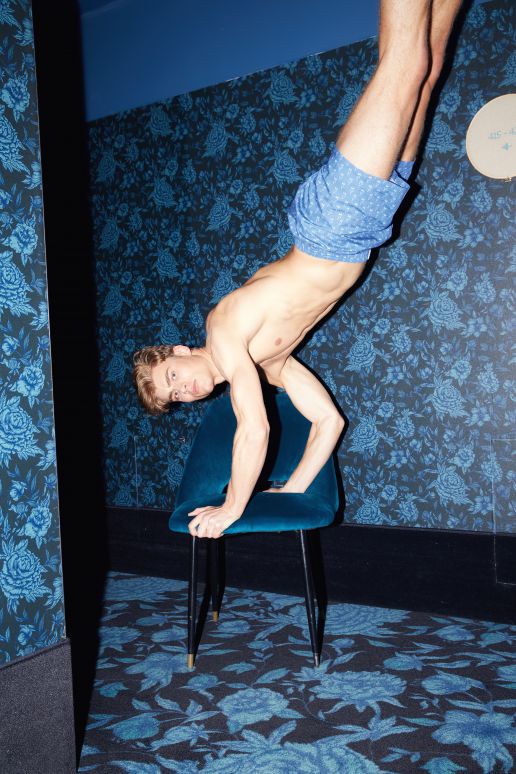
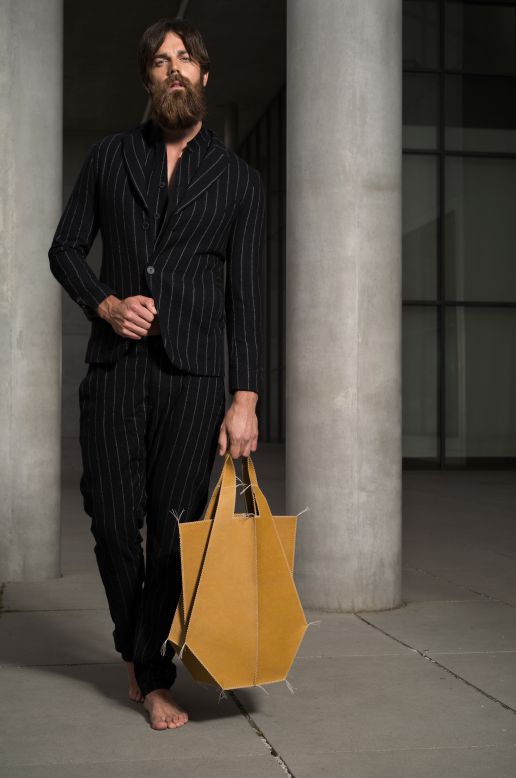
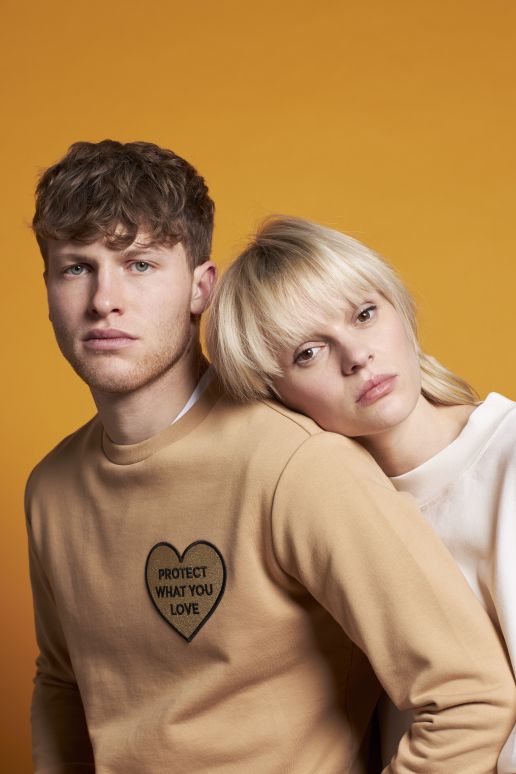
THE DETAILS
Where: Isarforum in the Deutches Museum, Ludwigsbrücke 1, Munich
What: Trade fair & conference with approx. 50 brands, 30 speakers
Why: … because sustainability is more than just a trend
When: March 13th -15th, 2020
Working hours (for public): Fri 5pm – 10pm, Sat 10am – 7pm, Sun 10am – 5pm
Admission (3 Day Ticket for Conference Fair): 10 euros (children up to 16 years free)
All information: greenstyle-muc.com
Ecosim – BLUEZONE Presents Denim Beyond the Seasons
ECOISM
Reject egoism, create ecoism, rewrite your future.
Our world needs to spare a thought… consumption, mass production, benefits and our ecosystems. ECOISM thrives on our need for a better world, for true sustainable solutions and the rethinking/overhaul of our industrial blue planet.
In a denim world moving at social media speed, denim trends are key to benefit end consumers and the industry with a clear direction. The BLUEZONE trend direction is split into two main categories to reflect our present and our future: themes which directly address fabric and product development, such as NO STRETCH or BLUE WELLNESS. And themes which tackle the important trending styles in our world, such as POWER DRESSING and ANTI BEAUTY.
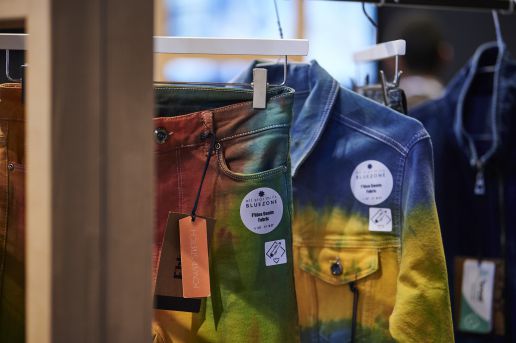
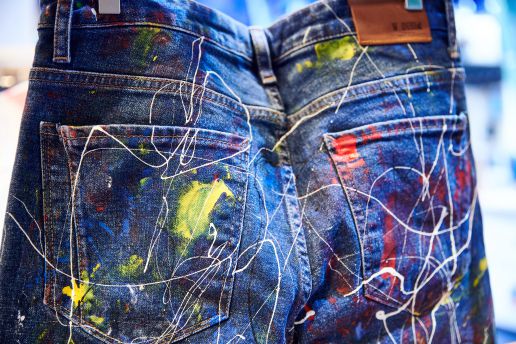
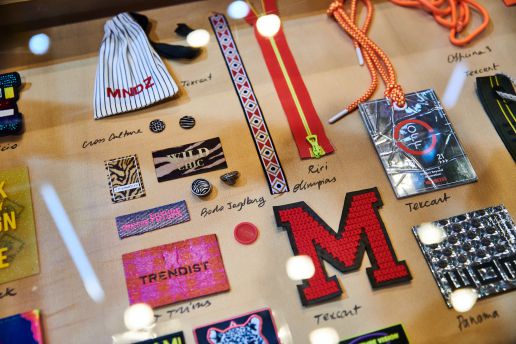
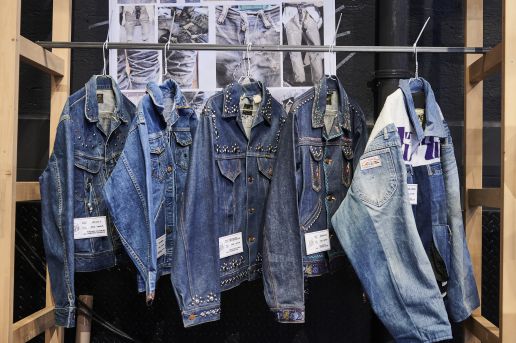
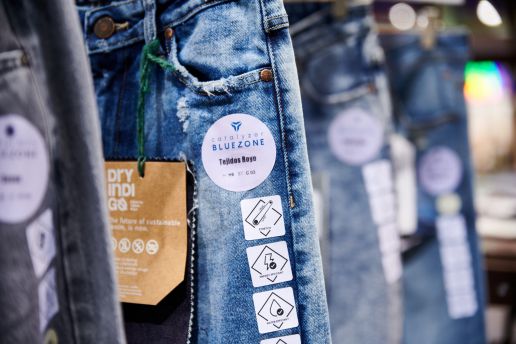
SHARING becomes more than a simple theme, it is the space where business becomes altruistic, where growth rhymes with sharing profit: A different way of conceiving denim in our modern world. “Sustainability is not a trend, but every trend should be sustainable.”
The following trend directions develop under the main topic ECOISM:
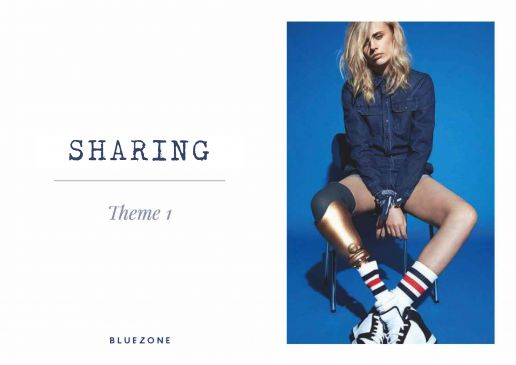
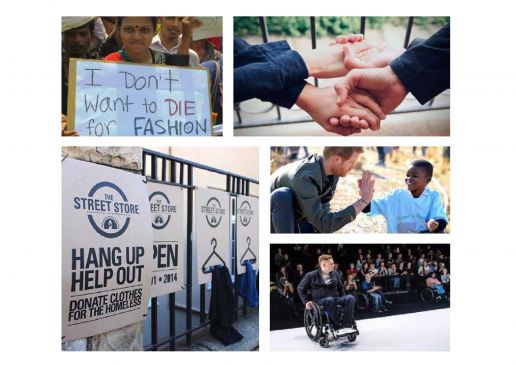
SHARING
Altruistic manufacturing, altruistic products, brand initiatives. Think: Products made in collaboration with people in need, small associations, handicapped. Products in which the benefits go to those in need.
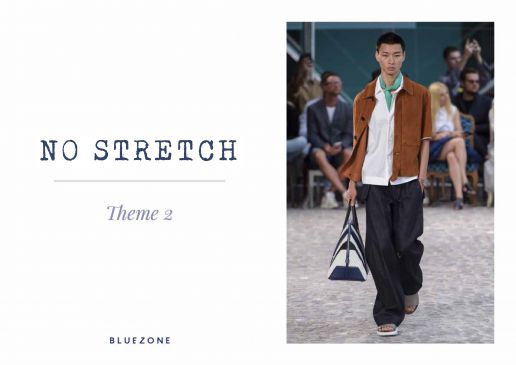
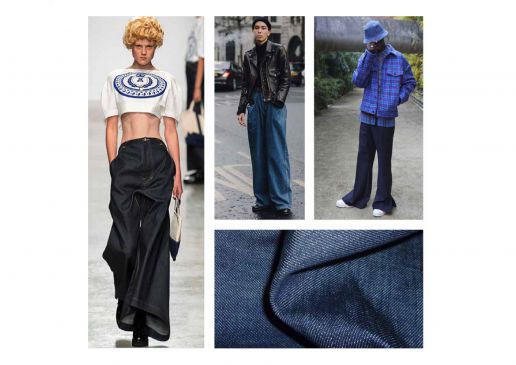
NO STRETCH
Novelties without stretch…male & female, gender neutral. Think: Wider fits are their way to becoming mainstream and need a new generation of more rigid, more compact fabrics. Trend looks are more relevant with crisp somewhat rigid denim. Surfaces might be soft but compact weaving is key.
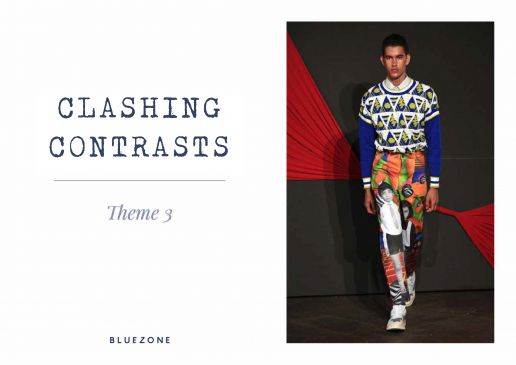
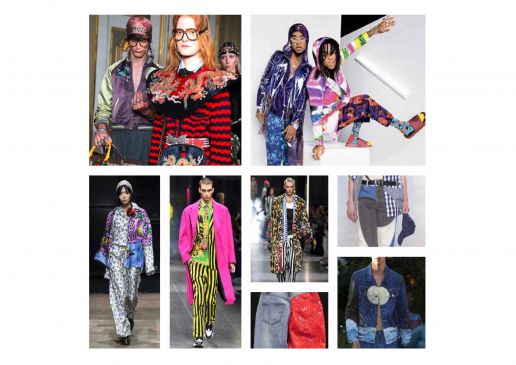
CLASHING CONTRASTS
A revolution in taste is key. Printed denim, coloured denim, and striped denim. Think: Jacquards, fancy weaves in unusual patchworks, layers, colour blockings. Strange visual matches, creating the antidote to harmony.
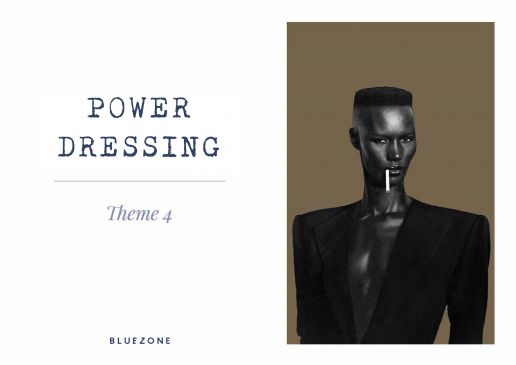
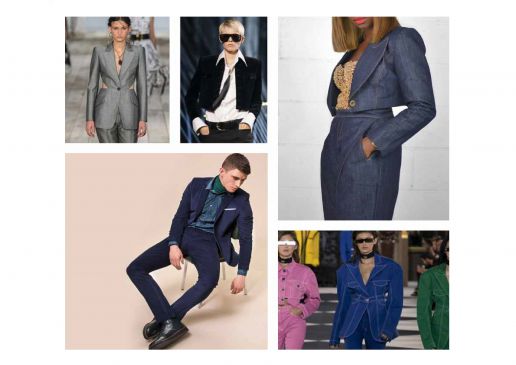
POWER DRESSING
Power dressing for a tough future. When politics go wrong, power dressing strikes back. Think: Business denim with a stylish twist. Power dressing also for men.
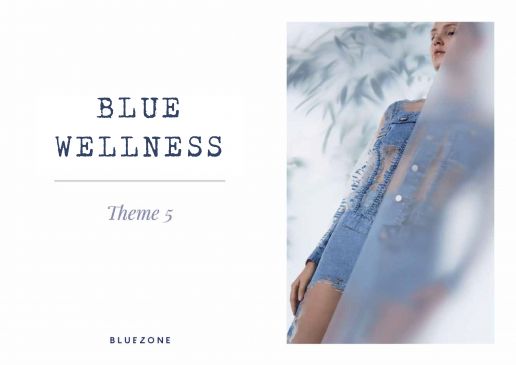
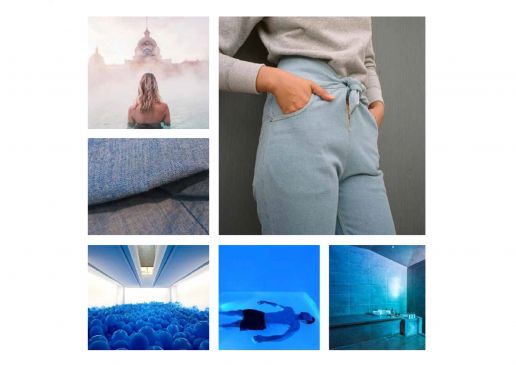
BLUE WELLNESS
The need for a soothing denim product. Denim that takes care of your skin, brain & body. Think: Fibers, coatings, ingredients, softness, anything that makes you and your body feel better.
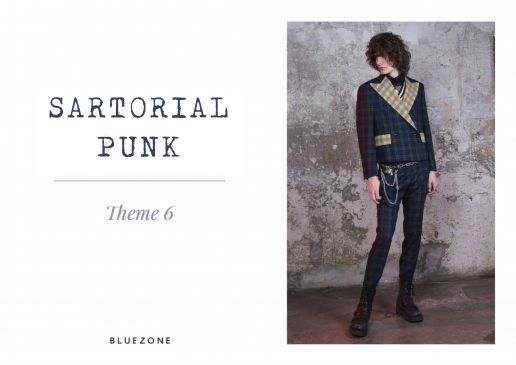
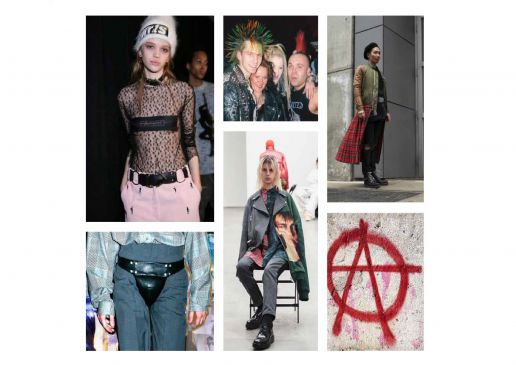
SARTORIAL PUNK
No future. Sartorial denim against Friday wear. A punk attitude with elegant codes. Think: Bleached and spotted denim. Black, grey, white denim, stretch and rigid fabrications.

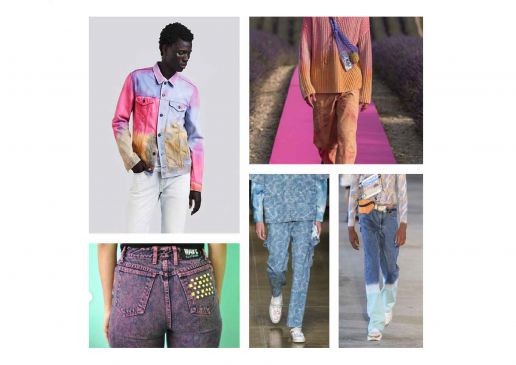
ACID PASTELS
The key is subtly in the effects. Acid fade-outs. Gritty yet pastel tenderness. Flowers, flowers, flowers … &animals, prints and solids. Think Acid effects on denim are key and tend to stay for some time. What is the next generation of acid and pastel effects on denim …
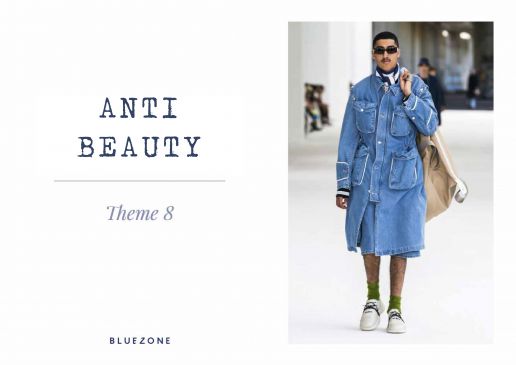
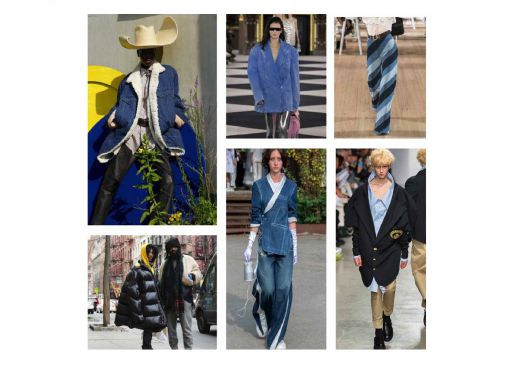
ANTI BEAUTY
Strange is the new beauty. Strange denim, strange products. New aesthetics, new proportions, sartorial, oversized, asymmetrical. Think: Flat-finished denim, reactive dye denim, Indigo denim.
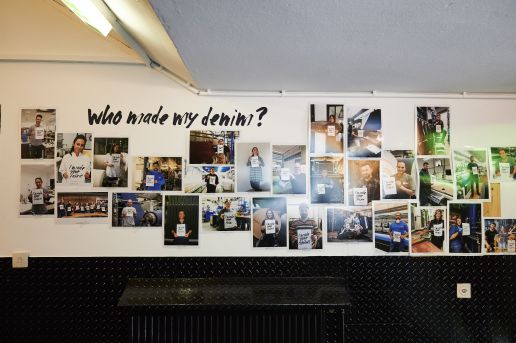
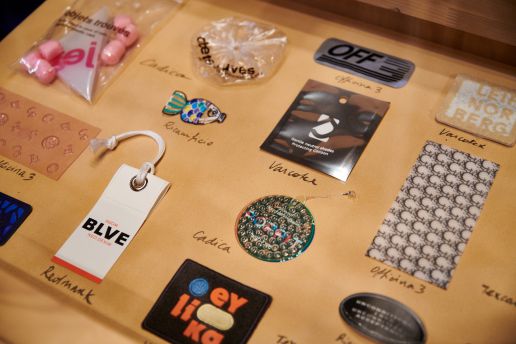
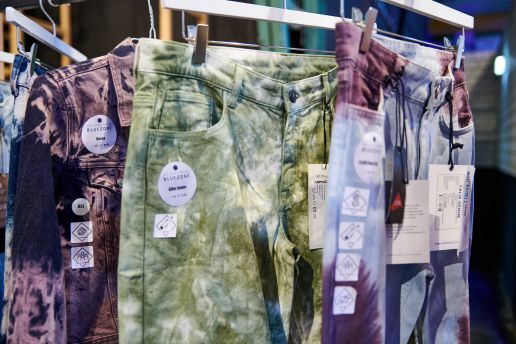
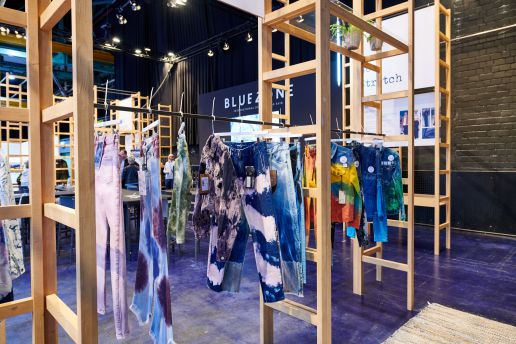
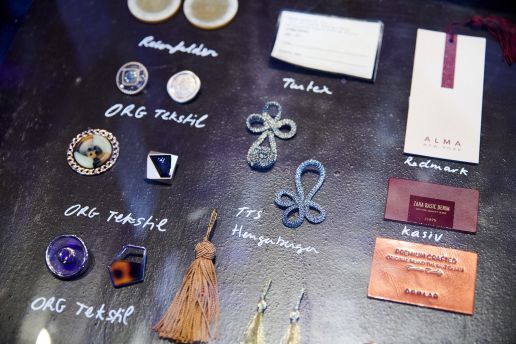
MUNICH FABRIC START – A Paradigm Shift Towards Holistic Sustainability
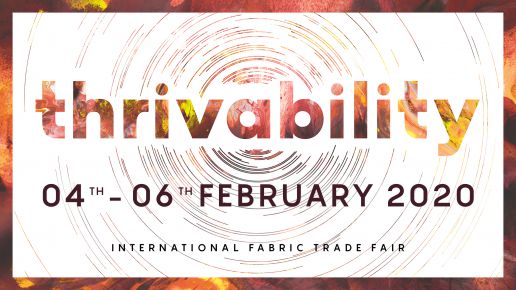
A new level of sustainability, digitalisation, transparency, a growing need for information and the desire to inspire
– that’s what the Spring.Summer 21 season stands for.
The awareness of a new ecology has become one of the strongest social movements. It challenges us to rethink, to take responsibility, to create transparency and to enter into an intensive dialogue.
The MUNICH FABRIC START with BLUEZONE, KEYHOUSE and the individual showcases presented by around 1,000 international suppliers of fabrics and additionals will introduce the Spring.Summer 21 season from 4 – 6 February in Munich. Approximately 20,000 trade visitors will have access to an extensive range of fabrics, additionals, designs, manufacturing services, supported by an informative and inspiring events programme.
The Spring.Summer 21 season is characterised by dynamism, waves and radiance – the guiding theme THRIVABILITY brings enthusiasm, creates excitement, let’s blossom and flourish. THRIVABILITY deconstructs our understanding of fashion and embeds a new, positive way of thinking: aesthetics and people see eye to eye; resources and nature are respected. This creates a new understanding of holistic sustainability and future-oriented entrepreneurial spirit. Spring.Summer 21 answers current market needs and reflects an evolved understanding of values. Knowledge, transparency, quality, responsibility and communication influence the current showcase of innovative product and processes on offer. THRIVABILITY combines the essence of this new era with a classic definition of trends and cultivates an inspiring and progressive direction for materials, fashion and design.


MUNICH FABRIC START HIGHLIGHTS
ASK THE EXPERT – Communication islands with THRIVABILITY experts.
Taking into account the focus on sustainability and innovation driven by THRIVABILITY, a new information concept will be integrated into the Trend Forum at the upcoming MUNICH FABRIC START. At various communication islands in the foyer of the MOC, industry experts will provide impulses and answers to current questions, from the origins of the material to exploring the diverse range of production processes and end garment recycling. Through direct discussions, you will gain valuable know-how, insights into topics and current solutions for both sustainable and innovative processes along the value chain:
CIRCULARITY | FIBERS & MATERIALS | MARKETING & COMMUNICATION | RECYCLING | SOCIAL RESPONSIBILITY
NEW ICON GUIDANCE SYSTEM
In addition, MUNICH FABRIC START has implemented a newly developed icon guidance system which in the spirit of transparency, identifies the sustainable and technical aspects of all the material highlights presented in the Trend Forums. In this way, visitors can establish these respective and previously hidden properties of textiles and ingredients at a single glance.
FABRICS
AWARENESS AS A DRIVER OF INNOVATION. Around 700 suppliers present their creative new developments across more than 1,000 collections – based on the latest technology innovations and the conscious and conservative use of resources. The fashionable combination of natural and innovative fibres is reflected in numerous new textile qualities including: luminous surfaces, wet gloss looks, soft glazes, colour gradients, transparent qualities, abstract patterns and relief elements. This season, MUNICH FABRIC START once again unites textile producers with a huge range of state-of-the-art fabrics, presenting not only essentials such as cotton, viscose, wool, elastane, lace and linen, but also novelties such as super-stretch silk, recycled polyester, Ecovero-Tencel linen, Naia and Cupro fibre blends or hemp textiles.
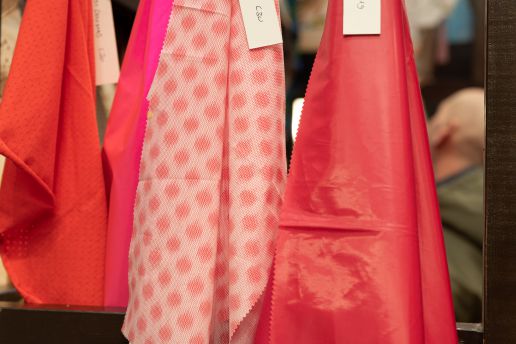
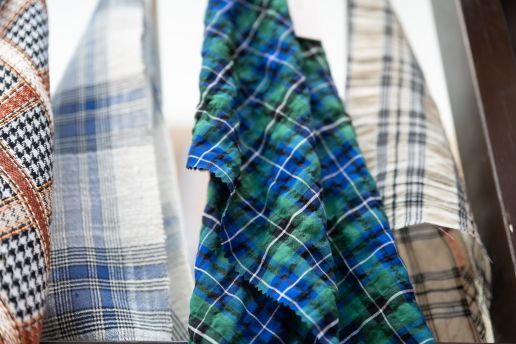
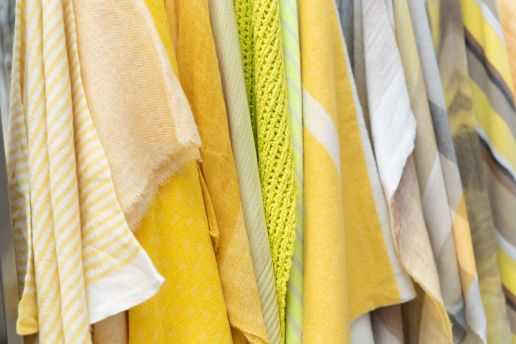
ADDITIONALS
TRIMS FOR FUTURE – this is the global motto which represents approximately 200 of the world’s leading international ADDITIONALS suppliers. Fashionable new developments revolve around iridescent surfaces, glowing yarns and electrifying colour applications. The focus is on recycled and sustainably produced products in natural colours. ITL Group will not only show its comprehensive range of products for the first time, but will also launch its C.A.R.E. Collection (Conscious, Affordable, Responsible, Eco-friendly labels) during the upcoming trade fair. Clic sums up these developments: “We have focused on realistic and organic articles that preserve nature both in form and texture”.
ReSOURCE
In a comprehensive forum, the ReSOURCE Area categorises and presents around 800 sustainably produced articles by exhibiting fabrics and additionals producers. “With our ground breaking DryIndigo® technology it is now possible to produce denim with 0% water consumption”, Tejidos Royo describes its latest milestone. Bornemann Etiketten sees the biggest challenge in balancing creativity, sustainability and efficiency, while Dutel focuses on timeless and durable top quality. Lanificio Roma pursues resource saving process solutions with the aim of wasting less and reusing production and consumption waste as new resources.
DESIGN STUDIOS
Natural colours based on sustainable dyeing techniques now determines the colour palettes of the inspiring designs at the internationally renowned, textile designers and trend offices in the DESIGN STUDIOS. The current change in the textile industry is leading to a revolution in the printing and dyeing industry and inspires a revival of natural dyes. Design Union and Primus Pattern also emphasize the simultaneous closeness to nature and diversity of textile prints for Spring.Summer 21.
SOURCING
Ready-made solutions are becoming more and more important and the interest in sourcing providers close to the market is also growing with a focus is on speed and a reduction in complexity. As globally established manufacturing companies in the SOURCING Area, numerous high-quality newcomers such as Easy Invest Solutions or Union 3 Fashion offer comprehensive insights into the entire textile production chain and its reliable procurement management. For Spring.Summer 21, Cascade Enterprises takes its inspiration from nature and returns to the basics in prints, fabrics and silhouettes. Sourcing specialist Fateks Kumas Tekstil offers and processes fabrics made from recycled PET bottles, also to conserve resources.
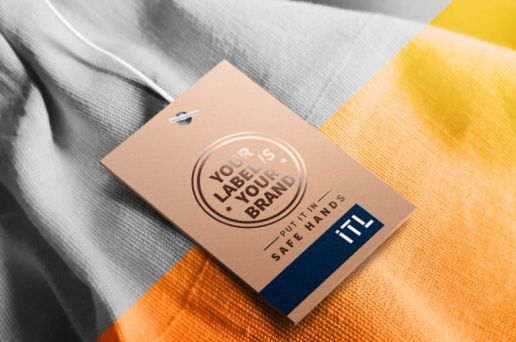
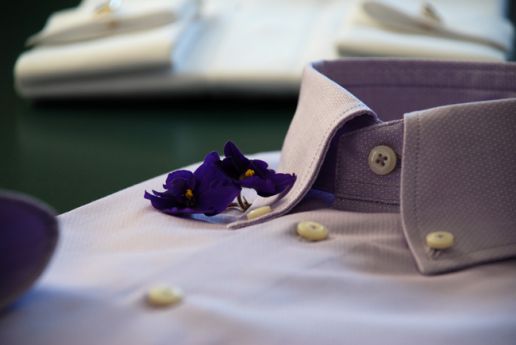
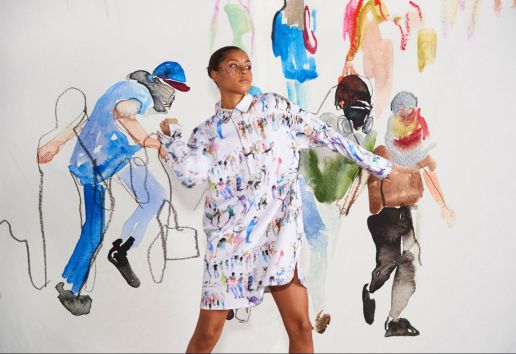
As the think tank for innovation, KEYHOUSE provides insights into future fabrics, new technologies, smart products & processes, sustainable innovations and alternative material resources, offering and inspiring pioneering concepts. For more information click here.
With over 100 major international brands, BLUEZONE has positioned itself as the initiator of an extraordinary, strong and innovative denim community. The answer to a conscious consumer approach and a growing interest in ready-made solutions that offer revolutionary products, state-of-the-art technological processes and complex functionalities. For more information click here.
KEYNOTES & SEMINARS
At the upcoming MUNICH FABRIC START, there will be a premium event programme featuring impressive panel discussions, polarising keynotes and trend seminars by international experts. The KEYHOUSE in Hall 5 will feature exciting lectures on the various subjects of innovation. The diverse events on offer in the BLUEZONE area of Hall 7 will provide an in-depth insight into the developments in the denim industry, while the ReSOURCE Forum in K3 in the MOC will offer an equally relevant programme on the topics of sustainability, certification and quality seals.
David Shah about „The 10 Design Pillars” – Tuesday, 4 Feb 2020, 10.30am – 12pm
The trend forecaster and publisher of Textile View will deliver the keynote “The 10 Design Pillars”. David Shah presents new perspectives on design influences from Slowbilisation to Hopepunk, from Biophilia to Datascapes.
Fashion Revolution – Tuesday, 4 Feb 2020, 12pm – 1pm
Ariane Piper gives an insight into Fashion Revolution – how the campaign will revolutionize the fashion industry. The viral campaign “Who made my clothes” will once again feature in the trend forums as an installation for transparency in the fashion industry.
Expert panel about „Future of the Textile Value Chain” – Tuesday, 4 Feb 2020, 2pm – 3.30pm
The panel discussion with expert participants on the subject of “Future of the Textile Value Chain” will be moderated by Jana Kern and Alex Vogt from KERN Consulting. The five international experts, including Prof. Dr. Michael Braungart, Hans H. Jung, David Shah, Jan Wilmking and Lauren Zahringer, will discuss the disruption and transformation through sustainability and networking in the textile value chain.
Rivet 50‘s 2020 Vision – Tuesday, 4 Feb 2020, 3pm – 4pm
What will the new decade bring for the denim industry and community? Rivet 50 will lead a discussion between some of the world’s most influential denim characters to discuss their predictions for business, technology and fashion.
Exclusive Trend Seminar by Li Edelkoort – Tuesday, 4 Feb 2020, 4pm – 6.30pm
Arguably the most famous trend forecaster of our time holds an exclusive trend seminar. In an impressive presentation, GREEN WAVE – the Fashion Trends for Spring.Summer 21, as GREEN BOOK – the Recreationwear Trends for Spring.Summer 21, as well as STILLNESS – a Full Colour Forecast for Autumn.Winter 21/22.
„Fashion Activism” Panel by Muchaneta Kapfunde – Wednesday, 5 Feb 2020, 11am – 12pm
FashNerd founder Muchaneta Kapfunde brings together the experts Kresse Wesling, Styliani Parascha, Marta Waydel and Marina Toeters as part of the panel discussion “Fashion Activism: Creating the Fashion of the Future.”
Hessnatur Stiftung about „The way to the green button“ – Wednesday, 05 Feb 2020, 11am – 12pm
Rolf Heimann, CEO of the Hessnatur Foundation, Institute for Applied Sustainability, explores in a lecture the question “How do I prepare my company for certification?”.
„How automation will change the fashion industry” – Wednesday, 5 Feb 2020, 2pm – 3pm
The five experts in technology, David Schmelzeisen, Ralf Schneider, Dr. Thomas Fischer, Jon Zornow and Sabine Kühnl will discuss “Don’t be afraid of robots – how automation will change the fashion industry” in a panel discussion. Automation, digitalisation and localisation are the trends that are reshaping the global fashion market. Is the fashion industry ready to adapt to new standards? What consequences does this have for the current procurement structure, also in terms of social responsibility?
“The data behind today’s winning marketing strategies” – Wednesday, 5 Feb 2020, 5pm – 6pm
Gina Gulberti, VP Digital Marketing at Launchmetrics, explains in her keynote “The data behind today’s winning marketing strategies”.
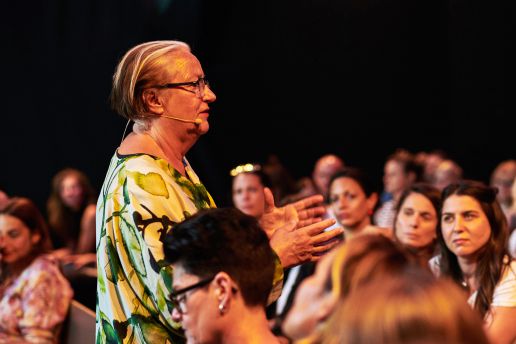
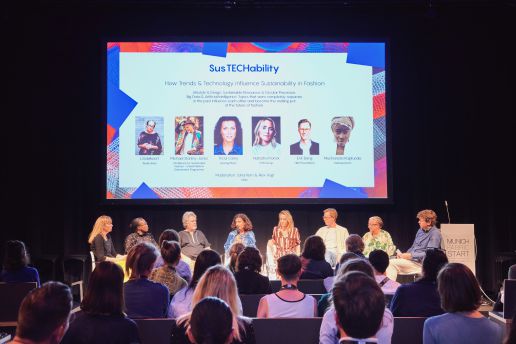
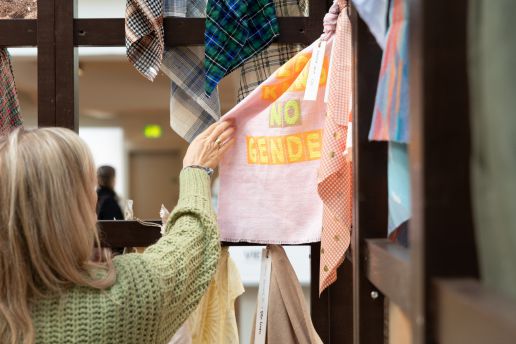
All dates and the complete events programme can be found here.
MUNICH FABRIC START & KEYHOUSE & SOURCING
04 February 2020 | 9.30am – 6.30pm
05 February 2020 | 9.30am – 6.30pm
06 February 2020 | 9.30am – 4.00pm
BLUEZONE
04 February 2020 | 9.30am – 6.30pm
05 February 2020 | 9.30am – 6.30pm
Sustainable Standards Guaranteed at ReSOURCE
With increasing importance placed on sustainability, the need to guarantee truly sustainable standards is in greater demand by buyers and brands. Ahead of their showcase at ReSOURCE at the next edition of MUNICH FABRIC START, we interviewed representatives Heike Hess of the International Association of Natural Textiles (IVN) and Franziska Dormann of Global Organic Textile Standard (GOTS).
Briefly, IVN awards two quality seals for ecologically produced products: NATURTEXTIL and NATURLEDER. For both seals, the association has defined parameters that have become a standard in the industry. The association is co-owner of GOTS, the worldwide standard for the production of sustainable textiles on an industrial scale.

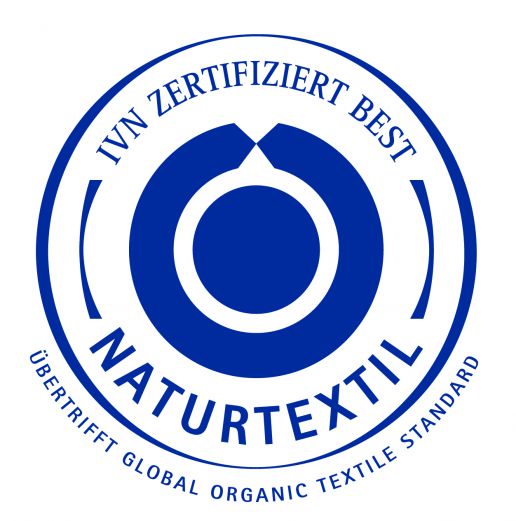
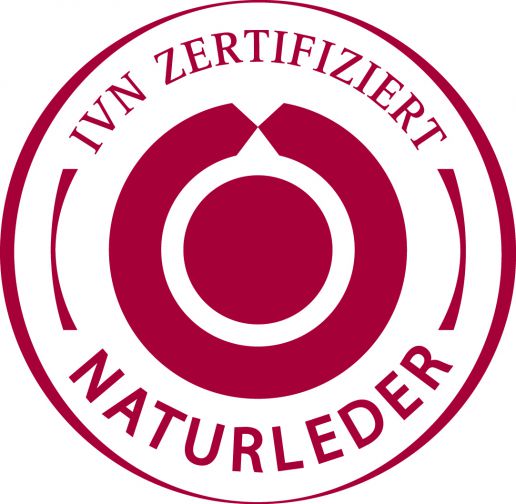
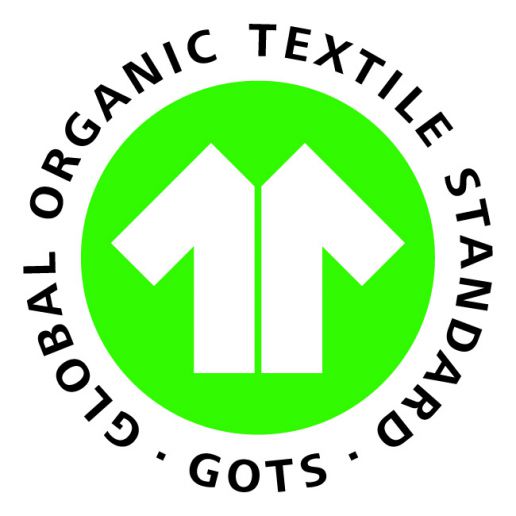
What is the most frequently asked question at the beginning of a consultation?
GOTS: Often it begins with a general introduction to the Global Organic Textile Standard, i.e. What is covered by the standard? How is this ensured? By reviewing the strict social and environmental criteria throughout the entire textile supply chain – from the fields to the wardrobe – GOTS guarantees safety and transparency for the consumer. The independent certification ensures credibility compared to mere self-explanatory statements.
IVN: Most visitors ask us for certifications and seals. How to get certified, which fabrics and accessories must be sourced to reach IVN BEST or GOTS requirements or how do our seals differ from others founds in ReSOURCE, register here.
What changes do you want brands to make in the next 5 – 10 years to bring about and anchor sustainable aspects of the textile industry?
GOTS: I think most people have recognized the importance and urgency of this because no one can fly under the radar for long. Sustainability interests those who have to justify themselves the most. For us, these are the brands that sell. Everyone involved is interested, the question is which actions follow? In industry, the spectrum ranges from greenwashing to genuinely practiced sustainability. Consumers range from lip service to showing a real willingness to spend more on sustainable products.
IVN: Many buyers, especially brands, are looking for certified fabrics. The selection of certified fabrics made with natural fibres in ReSOURCE is quite large, but for synthetic and regenerated fibres there is a lack of products that have been awarded truly sustainable seals. I would like to see more interest from the brands here, which would result in a stronger commitment on the part of the fabric suppliers.


How has the brands’ approach to research and purchasing changed over the last seasons?
GOTS: The trade fairs, as well as specific enquiries by e-mail, have resulted in more and more brands wanting to find out which suppliers are already GOTS-certified. Here I refer to the public database with almost 6,000 certified companies. Many companies that are interested in GOTS want to continue working with their existing suppliers and therefore jointly go the way of gaining certification of their entire supply chain.
IVN: You can clearly see that the topic of sustainability is becoming increasingly important for brands. Visitors at ReSOURCE are better prepared and ask more concrete questions. Many are looking for specific products and have clear expectations about what a fabric should be like. The typical length of time brands exhibit in the ReSOURCE area has definitely increased. More and more buyers who do not explicitly belong to sustainable companies are also showing interest in the products exhibited at ReSOURCE.
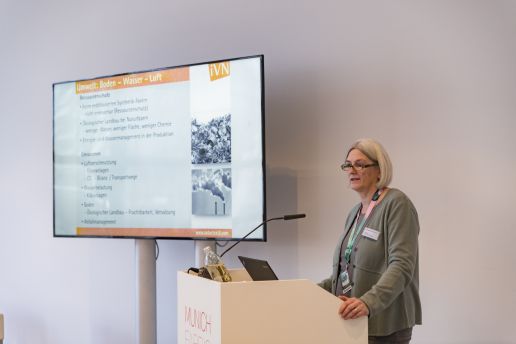
What are the specific challenges facing a future-oriented fashion industry?
IVN: The challenges vary depending on the size and orientation of the fashion companies. Smaller brands – especially in the sustainable segment – have problems finding certified suppliers who also supply small quantities. Larger companies use many different materials and accordingly many different suppliers. It is difficult to have an overview of the entire supply chain up to your own company, especially if you attach importance to a certain level of sustainability held by suppliers and sub-suppliers. It is still a challenge to reconcile certification and sustainability with the profitability of products. For particularly fashionable brands, it is still challenging to find exclusive or unique fabrics and additionals in sustainable qualities. There are certainly some other challenges, but overall it is more important that today means making sustainable fashion easier and more profitable than it was a few seasons ago.



A Conversation On Sustainability, Transparency & Mainstream
From slow fashion to mainstream business, materials to education, fashion and sustainability raise so many questions. A vast and complex issue, Muchaenta Kapfunde of FashNerd turned to 3 women making a difference in the sustainable fashion space.
Charney Magri a fashion photographer turned documentary maker. The co-founder of Fashion 4 Change has worked for the likes of British Vogue and Ralph Lauren, and now she is a partner for do epic sh*t. Olivia Pinnock is a London-based fashion journalist, lecturer and founder of The Fashion Debates. She is dedicated to uncovering insightful stories in a fascinating industry and promoting positive change for a more sustainable future for it. Abigail Morris is the Founder and CEO of Compare Ethics. It is a start-up that connects you to ethical brands through the latest online and offline experiences. Since launching in 2018, Compare Ethics is regularly featured in top social feeds and connects thousands of ethical shoppers with brands each week.
On the topic of sustainable fashion, I asked Charney, Olivia and Abigail to share their perspective on the most commonly asked questions.
CHARNEY MAGRI
Do you think that eco-fashion is still a niche market? If so, why?
The day that ‘Eco Fashion’ is just called ‘Fashion’ and is accepted as the norm, will be the day that I believe ‘Eco Fashion’ is no longer niche but rather just common sense.
In your opinion, what are the top 3 things that brands should focus on with regards to promoting their sustainable practice?
I don’t believe there are three focuses on promoting a sustainable brand. However, there are two main verticals in sustainable fashion: environmental and human rights. Both need to be addressed and both need to be made transparent for the success of any [sustainable] brand. As a visual communicator, I want to see all brands talking about this to their consumers as well as the right certifications in place to verify their practices.
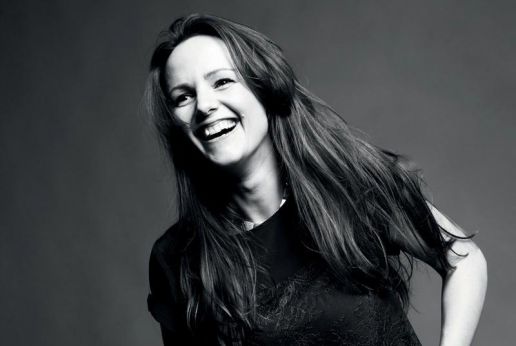
What advice would you give an individual looking to start-up a sustainable fashion retailer, particularly with the threat of a current ‘retail recession’?
Research is the first most crucial piece of advice. But the biggest obstacle you will come across is finances. Sourcing sustainable fibres and fabrics are more expensive than unsustainable options and mills will not accept small runs. You must build relationships with suppliers to be able to get the smaller quantities needed, and this takes time. I really believe there is a future in collaborating with like-minded designers to approach companies together so you can fulfil your orders when starting out.
ABIGAIL MORRIS
In your opinion, what are the top 3 things that brands should focus on with regards to promoting their sustainable practice.
1) Create a strong storytelling environment. Whether via online or offline experiences, sustainability is best shared as a story that people can easily back and tell their friends.
2) Be authentic. Nobody is perfect when it comes to sustainability. Bring people on your journey and celebrate your achievements with your community in real time.
3) Strive for increased transparency. Open up your supply chain and show people you are working to the highest ethical standards. Whether you are showing who made your clothes or using blockchain to track your supply chain, people increasingly want to know the provenance of your products.

Do you think ethical clothing will ever out-compete the mainstream less ethical products and dominate the fashion industry in the future? Why?
I don’t think new ethical clothing alone will out-compete the mainstream. However, what is more, interesting is how new business models will disrupt the fast fashion industry. ThredUp found that the second-hand market is growing 21 times faster than retail apparel over the last three years and is on track to be larger than fast fashion by 2028. At the same time, fashion rentals and sustainable fashion are moving into the mainstream. Given that fast fashion relies on volume, it will be interesting to see how and when mainstream brands will pivot towards a conscious fashion future.
Why do you think people are still buying from mainstream shops that sell unethical clothing?
People still buy unethical clothing because there is a variety with a strong product-market fit, and it is super easy to find. Sustainable fashion is making amazing strides on these areas. We increasingly see brands get product quality, price point and aesthetics right, but we need more choice and scale to compete. This has to be coupled with an easy way to find sustainable products. This is why we set up Compare Ethics – we know there are amazing sustainable products out there, it just has to be easy to find them.
OLIVIA PINNOCK
What do you see as the biggest challenge in getting customers to seek out more ethical and sustainable alternatives to high street fashion?
The biggest challenge is the convenience of mainstream fashion. It is far easier to seek out familiar brands that the consumers’ trusts, are fresh in their minds because of advertising and offers affordable fashion with next day delivery than it is to look for alternatives. Greenwashing is another issue that does damage to the whole sustainable fashion community as shoppers are not sure who they can trust.
What steps can we take to increase transparency and accountability for high street retailers?
I think governments have a tremendous amount of power in making the fashion brands that operate in their countries more transparent. We have seen it here in the UK with the Modern Slavery Act and the Environmental Audit Committee’s investigation into a fast fashion which bought CEOs from some of the biggest UK retailers into parliament to testify on what they’re doing about the issue. Companies are not going to give over information about their practices and their suppliers willingly for fear of giving valuable information to their competitors, but governments have the power to say that protecting garment workers and the environment is far more critical than that.

What advice would you have for people that want to be more conscious of their fashion choices?
Start with the wardrobe that you have. Consumers can make the most significant difference by changing how much they buy and how they manage their clothes at the end of their life. There are things you can do to support more ethical brands and put pressure on big brands, but where you can make an immediate, tangible impact is in your own home. Take steps to reduce how much clothing you’re buying, if it’s possible, and when you’re done with a piece of clothing, ask yourself whether it can be repaired or upcycled instead. If you still want to throw it away, can you give it to a friend to extend its life? It’s much better to give it to someone you know will wear it than take it to a charity shop where you don’t know where it will end up, especially if they can’t sell it if it’s not worth hanging on to someone, research how you can responsibly dispose of textiles in your local area through recycling schemes.


